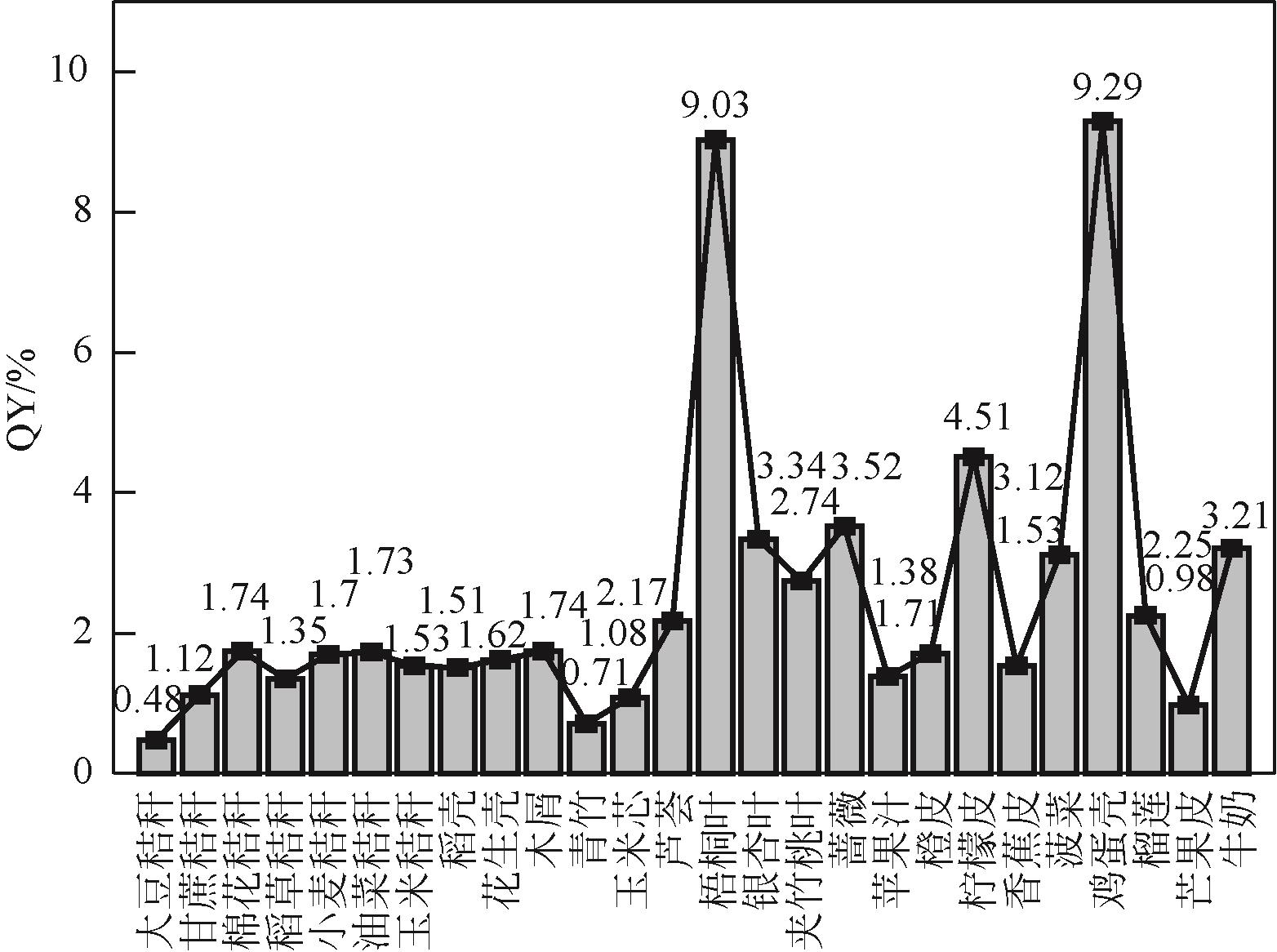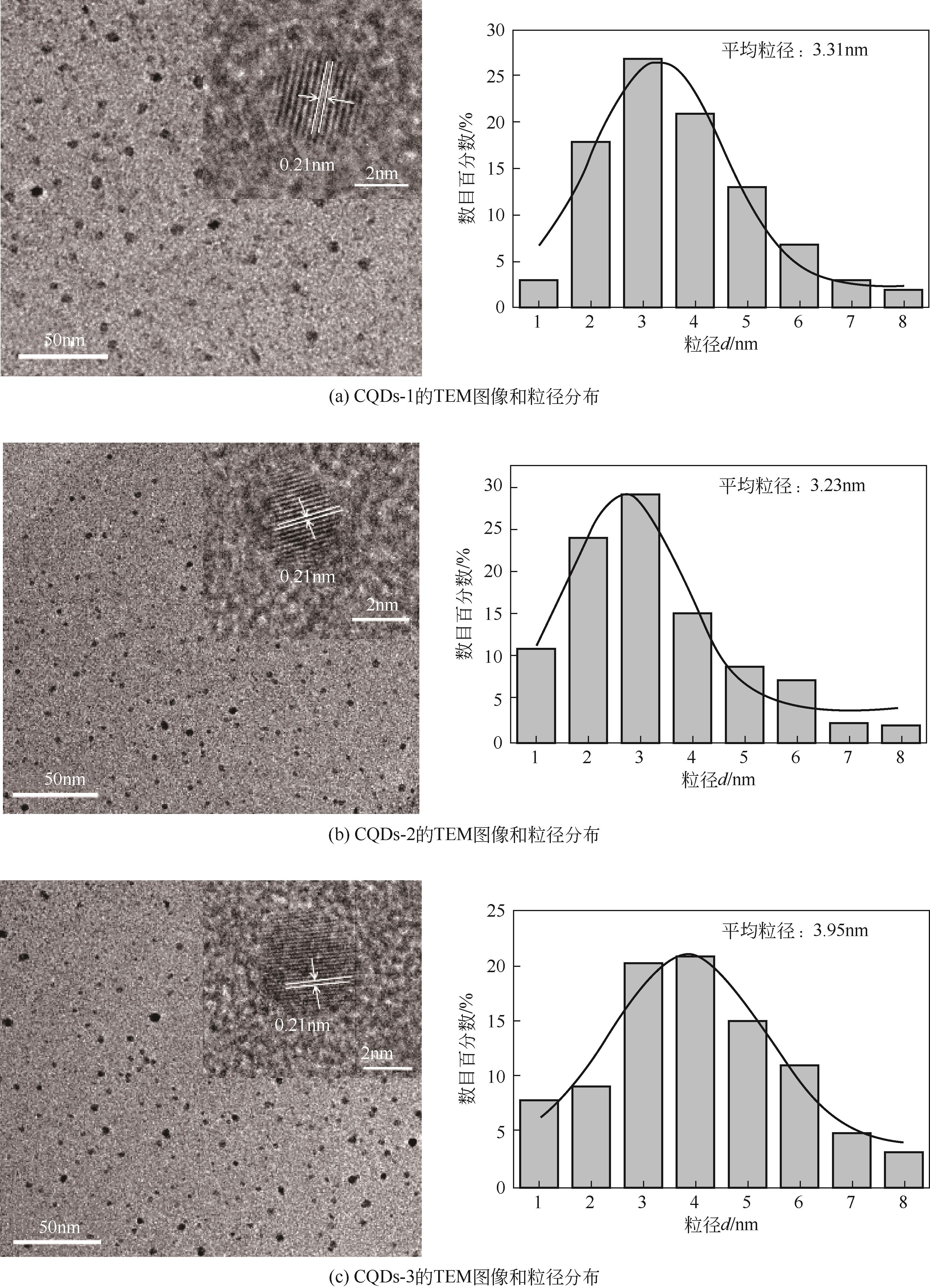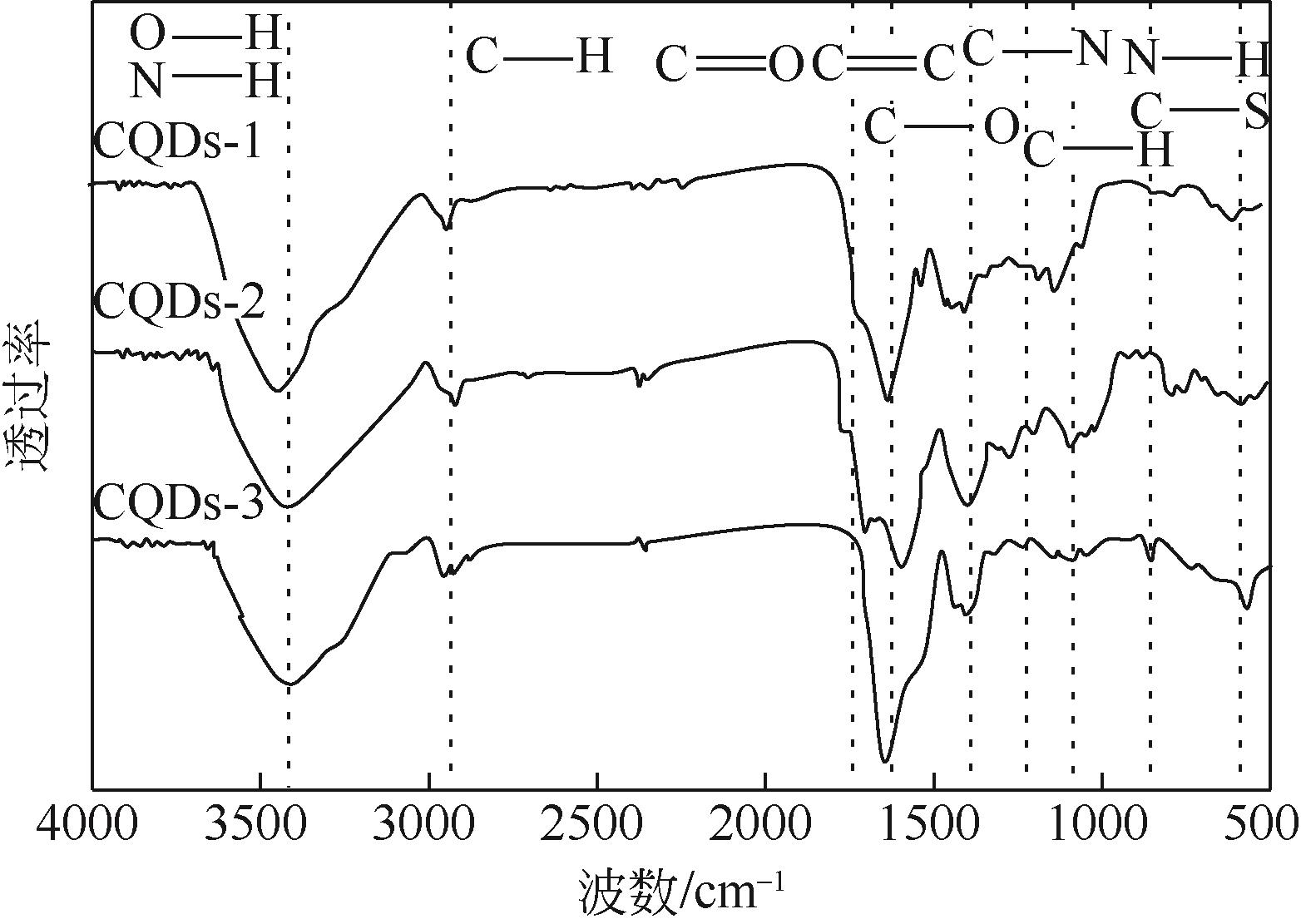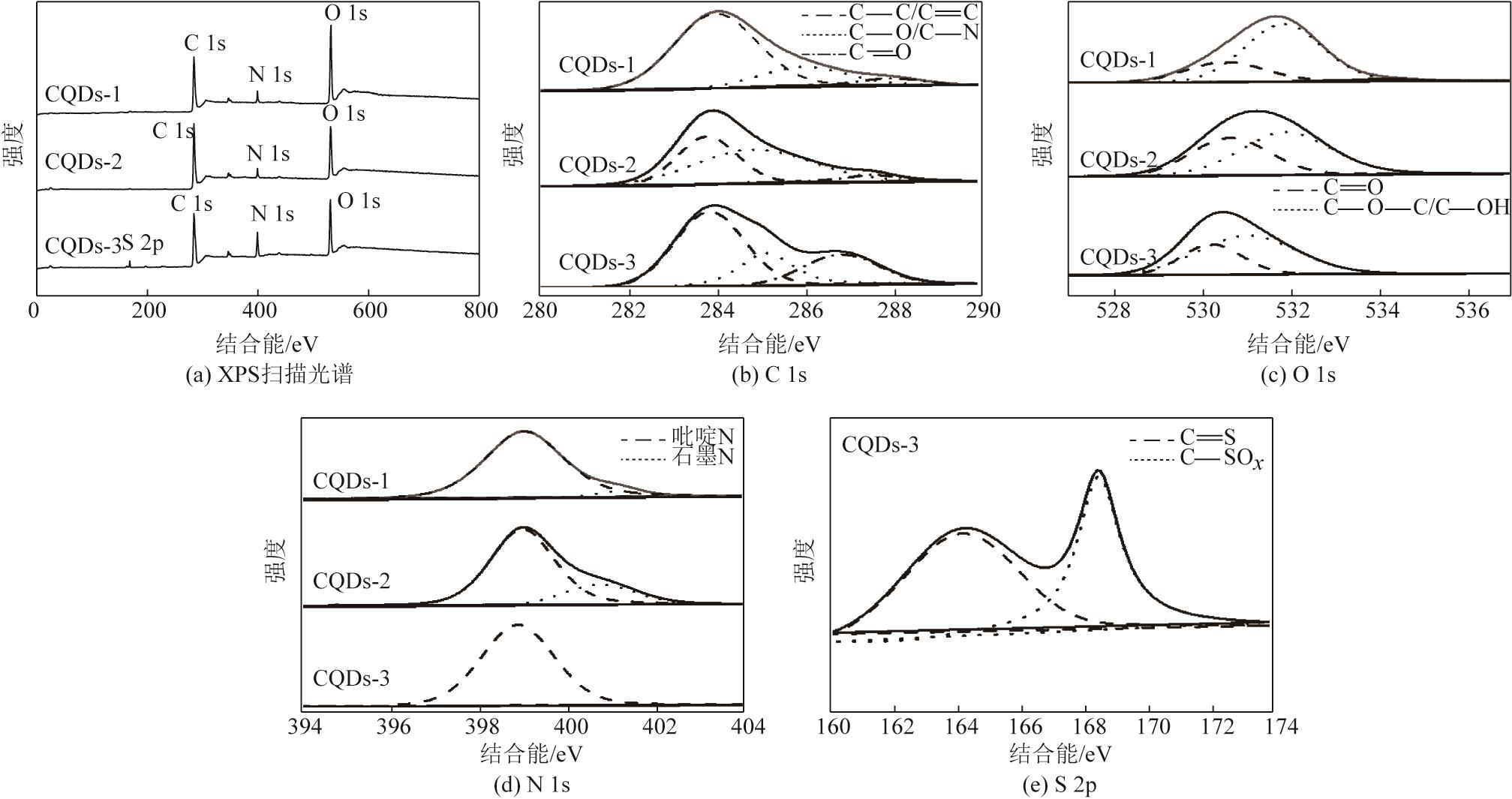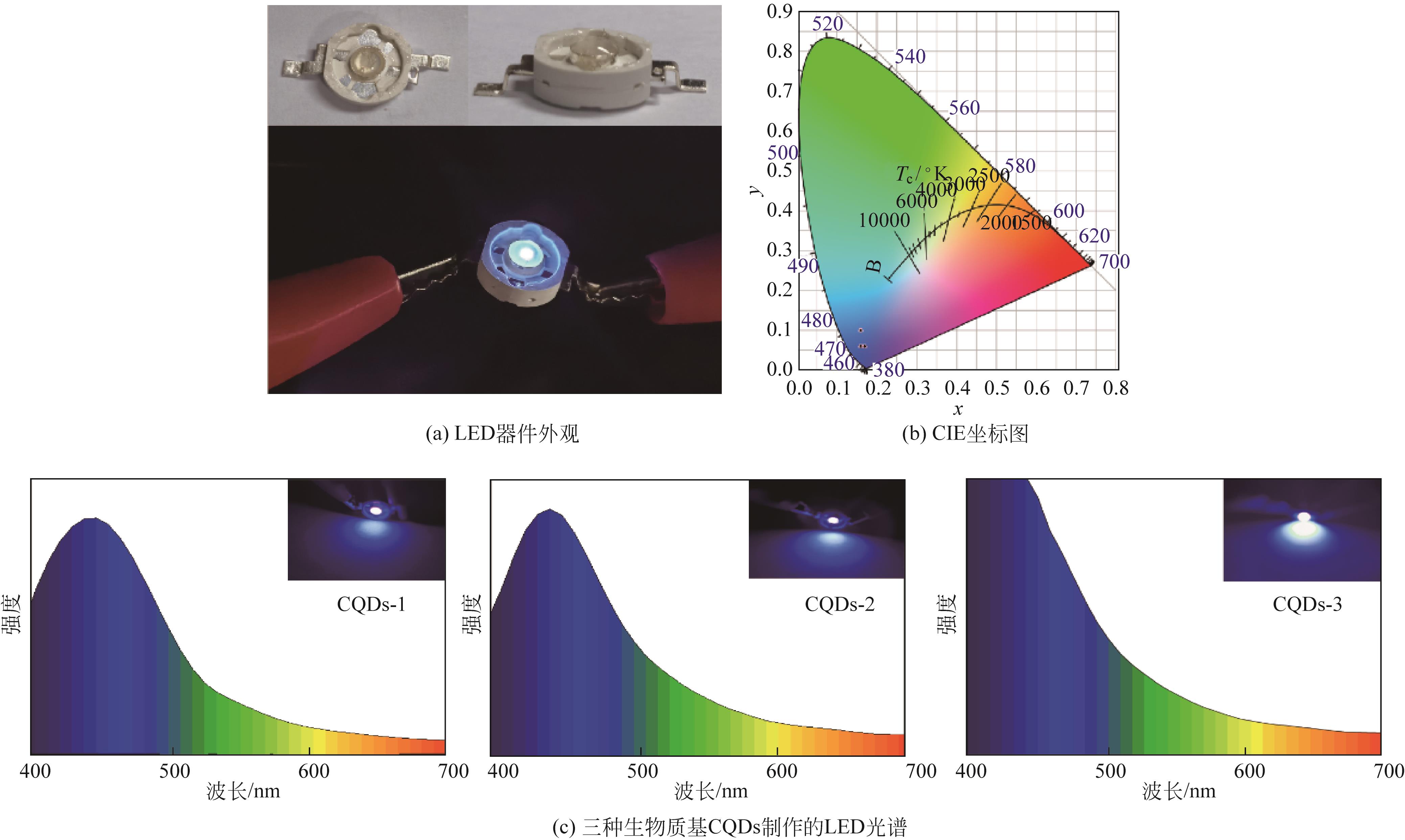Chemical Industry and Engineering Progress ›› 2023, Vol. 42 ›› Issue (11): 5852-5860.DOI: 10.16085/j.issn.1000-6613.2022-2346
• Materials science and technology • Previous Articles
Green synthesis of biomass-based carbon quantum dots and LED application
CAO Jin( ), ZHU Lingli, SHEN Dekui(
), ZHU Lingli, SHEN Dekui( )
)
- School of Energy and Environment, Southeast University, Nanjing 210096, Jiangsu, China
-
Received:2022-12-21Revised:2023-02-21Online:2023-12-15Published:2023-11-20 -
Contact:SHEN Dekui
生物质基碳量子点的绿色合成及其LED应用
- 东南大学能源热转换及其过程测控教育部重点实验室,江苏 南京 210096
-
通讯作者:沈德魁 -
作者简介:曹瑾(1997—),女,硕士研究生,研究方向为生物质能高价值利用。E-mail:220200388@seu.edu.cn。 -
基金资助:江苏省重点研发计划(BE2020114)
CLC Number:
Cite this article
CAO Jin, ZHU Lingli, SHEN Dekui. Green synthesis of biomass-based carbon quantum dots and LED application[J]. Chemical Industry and Engineering Progress, 2023, 42(11): 5852-5860.
曹瑾, 朱玲莉, 沈德魁. 生物质基碳量子点的绿色合成及其LED应用[J]. 化工进展, 2023, 42(11): 5852-5860.
share this article
Add to citation manager EndNote|Ris|BibTeX
URL: https://hgjz.cip.com.cn/EN/10.16085/j.issn.1000-6613.2022-2346
| 样品名 | O/C | N/C | S/C |
|---|---|---|---|
| CQDs-1 | 0.54 | 0.06 | — |
| CQDs-2 | 0.33 | 0.04 | — |
| CQDs-3 | 0.34 | 0.17 | 0.02 |
| 样品名 | O/C | N/C | S/C |
|---|---|---|---|
| CQDs-1 | 0.54 | 0.06 | — |
| CQDs-2 | 0.33 | 0.04 | — |
| CQDs-3 | 0.34 | 0.17 | 0.02 |
| 样品名 | 照度/lx | CIE坐标 |
|---|---|---|
| CQDs-1 | 7.13 | (0.17,0.06) |
| CQDs-2 | 3.33 | (0.16,0.06) |
| CQDs-3 | 7.84 | (0.16,0.10) |
| 样品名 | 照度/lx | CIE坐标 |
|---|---|---|
| CQDs-1 | 7.13 | (0.17,0.06) |
| CQDs-2 | 3.33 | (0.16,0.06) |
| CQDs-3 | 7.84 | (0.16,0.10) |
| 1 | LI Shuo, LI Lin, TU Hanyu, et al. The development of carbon dots: From the perspective of materials chemistry[J]. Materials Today, 2021, 51: 188-207. |
| 2 | 高雪, 孙靖, 刘晓, 等. 碳量子点的合成、性质及应用[J]. 化工进展, 2017, 36(5): 1734-1742. |
| GAO Xue, SUN Jing, LIU Xiao, et al. Carbon quantum dots: Synthesis, properties and applications[J]. Chemical Industry and Engineering Progress, 2017, 36(5): 1734-1742. | |
| 3 | MENG Weixue, BAI Xue, WANG Boyang, et al. Biomass-derived carbon dots and their applications[J]. Energy & Environmental Materials, 2019, 2(3): 172-192. |
| 4 | 杨培. 荧光可调半纤维素基碳点的合成及发光机理研究[D]. 南京: 南京林业大学, 2020. |
| YANG Pei. Synthesis and luminescence mechanism of fluorescent tunable hemicellulose-based carbon dots[D]. Nanjing: Nanjing Forestry University, 2020. | |
| 5 | LIU Yingshuai, ZHAO Yanan, ZHANG Yuanyuan. One-step green synthesized fluorescent carbon nanodots from bamboo leaves for copper(Ⅱ) ion detection[J]. Sensors and Actuators B: Chemical, 2014, 196: 647-652. |
| 6 | DIAO Haipeng, LI Tingting, ZHANG Rong, et al. Facile and green synthesis of fluorescent carbon dots with tunable emission for sensors and cells imaging[J]. Spectrochimica Acta Part A: Molecular and Biomolecular Spectroscopy, 2018, 200: 226-234. |
| 7 | SINGH Harpreet, BAMRAH Amy, KHATRI Madhu, et al. One-pot hydrothermal synthesis and characterization of carbon quantum dots (CQDs)[J]. Materials Today: Proceedings, 2020, 28: 1891-1894. |
| 8 | ATCHUDAN Raji, JEBAKUMAR IMMANUEL EDISON Thomas Nesakumar, SHANMUGAM Mani, et al. Sustainable synthesis of carbon quantum dots from banana peel waste using hydrothermal process for in vivo bioimaging[J]. Physica E: Low-Dimensional Systems and Nanostructures, 2021, 126: 114417. |
| 9 | YUAN Ming, ZHONG Ruibo, GAO Haiyang, et al. One-step, green, and economic synthesis of water-soluble photoluminescent carbon dots by hydrothermal treatment of wheat straw, and their bio-applications in labeling, imaging, and sensing[J]. Applied Surface Science, 2015, 355: 1136-1144. |
| 10 | MENG Weixue, WANG Boyang, AI Lin, et al. Engineering white light-emitting diodes with high color rendering index from biomass carbonized polymer dots[J]. Journal of Colloid and Interface Science, 2021, 598: 274-282. |
| 11 | WANG Cunjin, SHI Huanxian, YANG Min, et al. Facile synthesis of novel carbon quantum dots from biomass waste for highly sensitive detection of iron ions[J]. Materials Research Bulletin, 2020, 124: 110730. |
| 12 | SHAMSIPUR Mojtaba, BARATI Ali, KARAMI Sara. Long-wavelength, multicolor, and white-light emitting carbon-based dots: Achievements made, challenges remaining, and applications[J]. Carbon, 2017, 124: 429-472. |
| 13 | 苗湘. 碳点的光学调控及其应用研究[D]. 长春: 中国科学院大学(中国科学院长春光学精密机械与物理研究所), 2018. |
| MIAO Xiang. Synthesis of carbons dots with tunable optical properties and their applications[D]. Changchun: Changchun Institute of Optics, Fine Mechanics and Physics, Chinese Academy of Sciences, 2018. | |
| 14 | ZHENG Kun, LI Xu, CHEN Mingjun, et al. Controllable synthesis highly efficient red, yellow and blue carbon nanodots for photo-luminescent light-emitting devices[J]. Chemical Engineering Journal, 2020, 380: 122503. |
| 15 | JING Shuangshuang, ZHAO Yushuang, SUN Runcang, et al. Facile and high-yield synthesis of carbon quantum dots from biomass-derived carbons at mild condition[J]. ACS Sustainable Chemistry & Engineering, 2019, 7(8): 7833-7843. |
| 16 | ZHAO Siyu, SONG Xueping, CHAI Xinyu, et al. Green production of fluorescent carbon quantum dots based on pine wood and its application in the detection of Fe3+ [J]. Journal of Cleaner Production, 2020, 263: 121561. |
| 17 | DAI Ruoyu, CHEN Xipao, OUYANG Ning, et al. A pH-controlled synthetic route to violet, green, and orange fluorescent carbon dots for multicolor light-emitting diodes[J]. Chemical Engineering Journal, 2022, 431: 134172. |
| 18 | ZHANG Haimin, KANG Shenghong, WANG Guozhong, et al. Fluorescence determination of nitrite in water using prawn-shell derived nitrogen-doped carbon nanodots as fluorophores[J]. ACS Sensors, 2016, 1(7): 875-881. |
| 19 | ZHU Lingli, SHEN Dekui, LIU Qian, et al. Sustainable synthesis of bright green fluorescent carbon quantum dots from lignin for highly sensitive detection of Fe3+ ions[J]. Applied Surface Science, 2021, 565: 150526. |
| 20 | WANG Junli, ZHENG Jingxia, YANG Yongzhen, et al. Tunable full-color solid-state fluorescent carbon dots for light emitting diodes[J]. Carbon, 2022, 190: 22-31. |
| 21 | JI Chunyu, HAN Qiurui, ZHOU Yiqun, et al. Phenylenediamine-derived near infrared carbon dots: The kilogram-scale preparation, formation process, photoluminescence tuning mechanism and application as red phosphors[J]. Carbon, 2022, 192: 198-208. |
| 22 | LI Huiyu, ZHANG Zhaoxuan, DING Jie, et al. Diamond-like carbon structure-doped carbon dots: A new class of self-quenching-resistant solid-state fluorescence materials toward light-emitting diodes[J]. Carbon, 2019, 149: 342-349. |
| 23 | 杜勤. 暖白光LED用高荧光量子产率长波长碳量子点的制备[D]. 太原: 太原理工大学, 2018. |
| DU Qin. The synthesis of long wavelength fluorescent carbon dots with high quantum yield for warm white LED[D]. Taiyuan: Taiyuan University of Technology, 2018. |
| [1] | ZHANG Mingyan, LIU Yan, ZHANG Xueting, LIU Yake, LI Congju, ZHANG Xiuling. Research progress of non-noble metal bifunctional catalysts in zinc-air batteries [J]. Chemical Industry and Engineering Progress, 2023, 42(S1): 276-286. |
| [2] | HU Xi, WANG Mingshan, LI Enzhi, HUANG Siming, CHEN Junchen, GUO Bingshu, YU Bo, MA Zhiyuan, LI Xing. Research progress on preparation and sodium storage properties of tungsten disulfide composites [J]. Chemical Industry and Engineering Progress, 2023, 42(S1): 344-355. |
| [3] | LEI Wei, JIANG Weijia, WANG Yugao, HE Minghao, SHEN Jun. Synthesis of N,S co-doped coal-based carbon quantum dots by electrochemical oxidation and its application in Fe3+ detection [J]. Chemical Industry and Engineering Progress, 2023, 42(9): 4799-4807. |
| [4] | YANG Ying, HOU Haojie, HUANG Rui, CUI Yu, WANG Bing, LIU Jian, BAO Weiren, CHANG Liping, WANG Jiancheng, HAN Lina. Coal tar phenol-based carbon nanosphere prepared by Stöber method for adsorption of CO2 [J]. Chemical Industry and Engineering Progress, 2023, 42(9): 5011-5018. |
| [5] | YIN Xinyu, PI Pihui, WEN Xiufang, QIAN Yu. Application of special wettability materials for anti-hydrate-nucleation and anti-hydrate-adhesion in oil and gas pipelines [J]. Chemical Industry and Engineering Progress, 2023, 42(8): 4076-4092. |
| [6] | WANG Shuaiqing, YANG Siwen, LI Na, SUN Zhanying, AN Haoran. Research progress on element doped biomass carbon materials for electrochemical energy storage [J]. Chemical Industry and Engineering Progress, 2023, 42(8): 4296-4306. |
| [7] | TANG Lei, ZENG Desen, LING Ziye, ZHANG Zhengguo, FANG Xiaoming. Research progress of phase change materials and their application systems for cool storage [J]. Chemical Industry and Engineering Progress, 2023, 42(8): 4322-4339. |
| [8] | WU Ya, ZHAO Dan, FANG Rongmiao, LI Jingyao, CHANG Nana, DU Chunbao, WANG Wenzhen, SHI Jun. Research progress on highly efficient demulsifiers for complex crude oil emulsions and their applications [J]. Chemical Industry and Engineering Progress, 2023, 42(8): 4398-4413. |
| [9] | ZHENG Mengqi, WANG Chengye, WANG Yan, WANG Wei, YUAN Shoujun, HU Zhenhu, HE Chunhua, WANG Jie, MEI Hong. Application and prospect of algal-bacterial symbiosis technology in zero liquid discharge of industrial wastewater [J]. Chemical Industry and Engineering Progress, 2023, 42(8): 4424-4431. |
| [10] | XU Peiyao, CHEN Biaoqi, KANKALA Ranjith Kumar, WANG Shibin, CHEN Aizheng. Research progress of nanomaterials for synergistic ferroptosis anticancer therapy [J]. Chemical Industry and Engineering Progress, 2023, 42(7): 3684-3694. |
| [11] | GUAN Hongling, YANG Hui, JING Hongquan, LIU Yuqiong, GU Shouyu, WANG Haobin, HOU Cuihong. Lignin-based controlled release materials and application in drug delivery and fertilizer controlled-release [J]. Chemical Industry and Engineering Progress, 2023, 42(7): 3695-3707. |
| [12] | SHAN Xueying, ZHANG Meng, ZHANG Jiafu, LI Lingyu, SONG Yan, LI Jinchun. Numerical simulation of combustion of flame retardant epoxy resin [J]. Chemical Industry and Engineering Progress, 2023, 42(7): 3413-3419. |
| [13] | YU Zhiqing, HUANG Wenbin, WANG Xiaohan, DENG Kaixin, WEI Qiang, ZHOU Yasong, JIANG Peng. B-doped Al2O3@C support for CoMo hydrodesulfurization catalyst and their hydrodesulfurization performance [J]. Chemical Industry and Engineering Progress, 2023, 42(7): 3550-3560. |
| [14] | YANG Jingying, SHI Wansheng, HUANG Zhenxing, XIE Lijuan, ZHAO Mingxing, RUAN Wenquan. Research progress on the preparation of modified nano zero-valent iron materials [J]. Chemical Industry and Engineering Progress, 2023, 42(6): 2975-2986. |
| [15] | XU Chunshu, YAO Qingda, LIANG Yongxian, ZHOU Hualong. Effects of graphene oxide/carbon nanotubes on the properties of several typical polymer materials [J]. Chemical Industry and Engineering Progress, 2023, 42(6): 3012-3028. |
| Viewed | ||||||
|
Full text |
|
|||||
|
Abstract |
|
|||||
